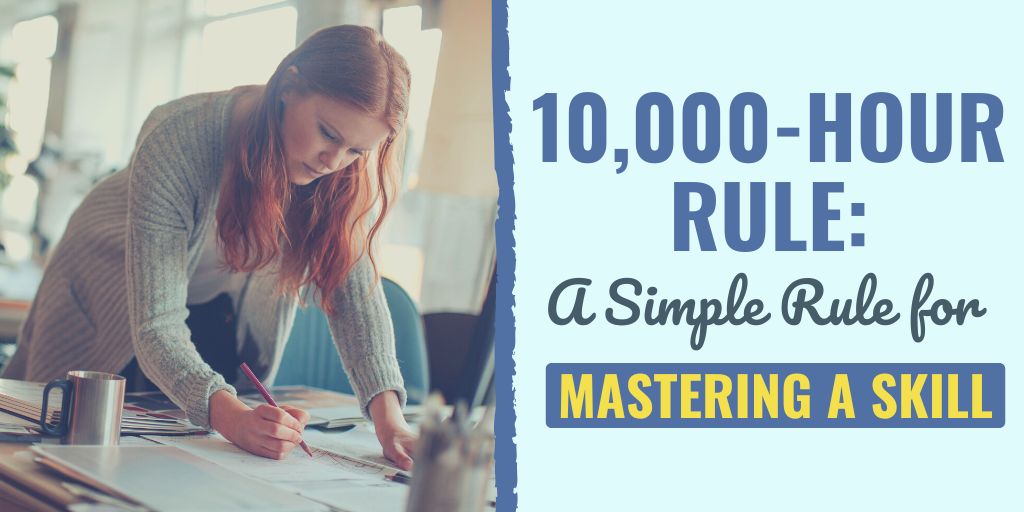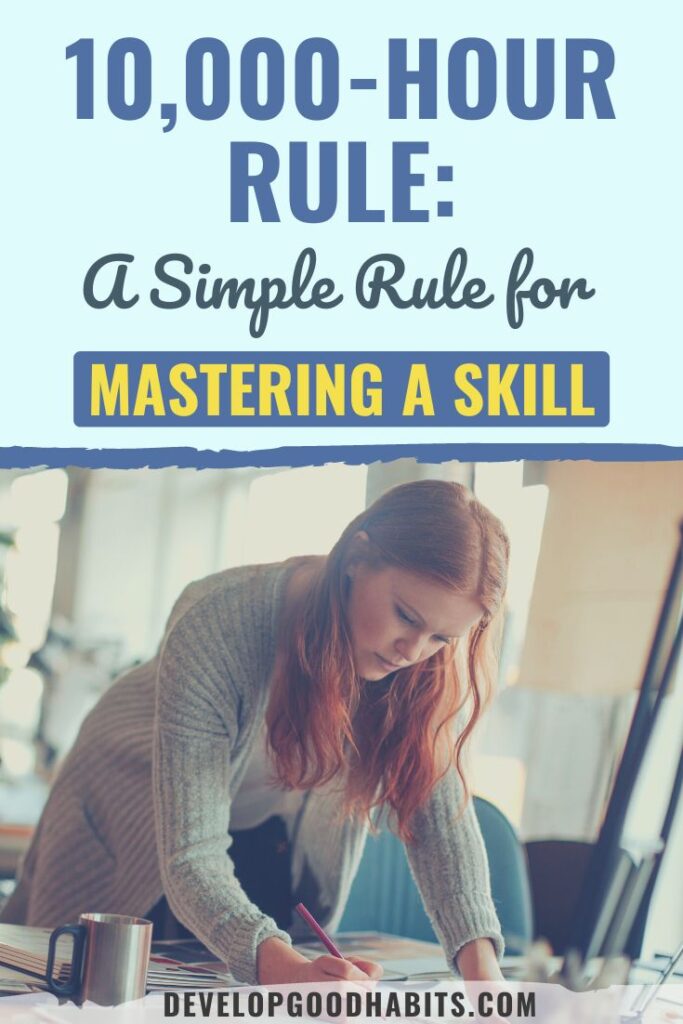“Learning isn’t a way of reaching one’s potential but rather a way of developing it.”
– K. Anders Ericsson
In his book Outliers, Malcolm Gladwell popularized the idea that it requires 10,000 hours of concentrated practice in order to possess what is considered a world-class skill in something.
Whether you intend to become the most sought-after motivational speaker, the next Michael Phelps, or you want to master a foreign language, you need to face the fact that becoming excellent in your chosen field will take time.
But many people wonder:
Does it really require 10,000 hours of practice to be considered world-class at a specific skill or talent?
Or are there other (i.e., faster, more efficient) ways to master a skill?
Before we answer these questions, let’s first revisit the 10,000-hour rule, and how it became a popular benchmark of achieving excellence.
What Is the Origin of the 10,000-Hour Rule?
In 2008, Malcolm Gladwell’s book Outliers: The Story of Success was published and immediately became a bestseller.
The book featured several high-profile personalities, and Gladwell proposed the 10,000-hour rule to describe those who do not fit into the usual definition of success and achievement.
Throughout the book, Gladwell used the 10,000-hour rule as the key to achieve success. For Gladwell, it meant correctly practicing a skill for around 10,000 hours in order to arrive at an expertise that’s considered to be world-class.
As Outliers became popular, so did the principle of the 10,000-hour rule. Many people who read the book immediately applied Gladwell’s idea and strove to clock in the prescribed number of hours in order to reach a level of excellence in sports, the arts, and even business.
Many took this as great advice for self-improvement, and it gave hope to others who had initially thought that it takes genetics and affluence to succeed.
Unfortunately, there are those who would dispute Gladwell’s claims, and continue to wonder, “What is the significance of the 10,000-hour rule?”
Gladwell based his 10,000-hour rule on research done by a scientist named K. Anders Ericcson. However, Gladwell did not actually interview Ericcson.
Ericcson’s research sought to answer the question: “How do people improve?”
He discovered that it took around 10,000 hours for people to excel in fields such as chess, golf, and competitive musical performance. However, this has no bearing on academics or when one wants to learn a new set of skills for a career or embarking on a new hobby.
(If you would like to learn how to build your skills, then be sure to read this review of the Skillshare online learning platform.)
Ericcson also found that becoming an expert in a field is not about how much you practice. Rather, it is about how you practice. He called the concept deliberate practice.
According to Josh Kaufman, author of The Personal MBA, it only takes a total of around 20 hours to learn a new skill.
Knowing this, we can now say that it should not take you as long as 10,000 hours to become an expert in something.
So how can you be more efficient in your learning process?
In this article, we will look at 11 ways that you can master a skill and bust the 10,000-hour myth. It may take everyone a different number of hours to become an expert, but you certainly don't need to spend literally thousands and thousands of hours to master a skill.
11 Ways to Master ANY Skill
Here are some ways for you to master a skill.
1. Identify what you want to be able to accomplish.
In order to successfully master a skill, you have to be selective in what that skill is going to be. Picking the wrong skill can hinder your success from the beginning, so you want to make sure the skill is applicable to your life.
The perfect skill for you to master either solves a problem that you have or is directly related to something that you are very interested in. Otherwise, you will lose the motivation and perseverance that you need to be successful.
This means that you want to pick a skill where the process of mastering it is as exciting as reaching your end goal. For example, let's say you want to learn how to code computers so you can create a specific program.
If you are overwhelmed by the learning process—or worse, if you are bored—you are setting yourself up for failure. Your perspective on learning has to be that it is engaging, not difficult.
Research shows that having a focus on your long-term goals is great motivation to get started, but it may prevent you from enjoying the learning process. Alternatively, focusing on the current enjoyment of learning a new skill will increase your likelihood of sticking with it.
Another thing you want to do when you're identifying what you want to be able to accomplish is to set very specific goals that require you to have a clear path.
Vague goals are not very motivating because they lack inspiring details. It is harder to create your milestones to help you know that you are making progress.
Making specific goals forces you to be more detailed and pinpoint their real meaning for you. For example, a general goal would be “I want to exercise more.” A more specific goal would be “I want to get a membership at my local gym and workout four days a week to improve my health.”
Pick something that will solve a problem for you, or that you have a deep interest in. Make sure that you are interested in the process of learning your skill of choice, and be very specific when you're setting learning goals.
2. Accept your current experience level.
This could mean admitting that you are a complete beginner at the skill you wish to master. Keep in mind that everyone interprets “mastering” something differently. Your definition of mastering a skill might be very different than someone else's.
Take public speaking as an example. Somebody who wants to master the art of public speaking may believe that they have to be able to talk in front of hundreds of people without missing a beat, but you might define this as being comfortable giving a presentation to a small group of coworkers.
If you set a goal that requires you to far exceed your current experience level in a short amount of time, there is a big chance you will become overwhelmed and give up.
However, if you set a reasonable goal with your experience level in mind, and you are able to stick to it, it will be more reasonable to hit your milestones and achieve your goal.
3. Determine how you learn best.
You may learn better if you’re doing something hands-on. Or perhaps you prefer watching others demonstrate and you follow. Follow the learning method that you feel works best for you.
Research has shown that, in general, people only retain 5% of the information that they hear when someone is giving a lecture.
But people retain 75% of the information they learn when they practice what they've learned. What's more, people generally retain 90% of the information they learn if they teach it to other people.

To get your mind ready to absorb information, make sure that you are taking care of yourself by getting enough high-quality sleep and sufficient exercise. Not only will this help you learn faster, it will also activate neurons in your brain to increase your ability to learn and retain information.
4. See if you can break down a skill into subskills.
This way you don’t get overwhelmed. The manageable parts can help you feel at ease when starting to learn the skill.
Deconstructing a skill starts with identifying the most basic building blocks of the skill that you should start with. Let's say you want to learn a new language.
Avoid telling yourself that you will “Learn French.” Instead, break this down into more specifically defined and smaller goals like “I want to master the first level of a French learning program within three weeks”.
Here, you have clearly defined your target and made a monumental task infinitely more manageable.
5. Learn the most important subskills.
Every skill can be broken down into smaller skills that all fit together in the end to accomplish your long-term goal.
You want to identify these goal segments and establish which ones are truly necessary for success—and pay attention to those first. Once you have done this, use deliberate practice to learn them.
Create celebration points for your learning journey so you can take pride in your progress. Recognize the achievement of mastering each subskill so you can maintain long-term motivation.
For example, if you want to master playing the guitar, you can break it down into subskills of learning four different songs, starting with the easiest and getting progressively harder. Each song you learn will be a subskill of the next, more challenging one.
6. Focus on the quality of work.
While practicing, focus on the quality of your work rather than the quantity or the duration of your practice.
Think about the 80/20 rule here. We know that 80% of your learning will come from 20% of the work that you do. Identify the 20% of work that will give you the most results when you are learning something new.
For example, when learning French, you will quickly notice that there are some very important keywords that come up repeatedly. Look up the “most commonly used French words” and focus on them first.
You could spend hours trying to learn the names of all of the animals in French, but in the end, that is not going to benefit you as much as spending a shorter amount of time on words that are relevant to everyday language.
One of the issues with the 10,000-hour myth is that the focus is on the extensive amount of time, which means that the quality of your practice will suffer.
Sidenote: Want to achieve more with less effort? Watch this video to learn how you can apply the 80/20 rule or the Pareto Principle to ALL aspects of your life:
7. Find a good mentor.
Find a mentor, coach, or teacher who can give you feedback about how you are doing.
When you’re learning a skill, it can be difficult to determine where to start. Having a mentor can give you some leadership and high-quality advice from someone who has already been in your shoes.
When meeting with your mentor, have specific questions in mind, such as asking them about any roadblocks they faced when learning the skill, or what part of the skill they use on a regular basis versus what has been forgotten.
You may also want to ask your mentor what they think sets an expert apart from non-experts in their field.
8. Share what you know with others.
By becoming a teacher for the skill you are trying to master, you get a better grasp of what you are doing. As previously mentioned, teaching is actually one of the best ways to learn.
If you are able to understand a concept or idea well enough to relay it to others, it will help you internalize the information yourself.
There are several ways that you can put yourself into a teacher position, even if it isn't in a classroom setting. Teaching can be done informally, without a firm structure, with as many or as few people as you want.

Find a friend who is also interested in gaining this skill, and start working with them to get them started. Or find a scenario that will somehow allow you to convey your expertise and knowledge.
By doing this, you can gain a deeper understanding of the subject matter or a new insight for how to use it. It will also give you the opportunity to figure out what method of teaching the material tends to work best for others.
Doing this will help you strengthen your own ability to learn and improve your soft skills with different people in all areas of your life.
9. Practice during your most productive time.
Practice during the time of day when you feel most productive. It helps you focus more.
Everyone goes through low points of productivity during the day, and trying to power through these times can lead to substandard results.
Studies have shown that working too much greatly reduces productivity because your brain can only focus for an hour and a half to two hours before needing a short break to continue to focus.
You can figure out what your most productive work times are by paying close attention to your habits each day, along with your energy and level of focus. For example, you probably already know if you are a morning person or tend to be more alert at night based on when you're feeling the most attentive.
Next, you have to figure out the best time management techniques for you so you can get these 90- to 120-minute working periods scheduled into the productive time of your day.
Doing this will also help you prevent becoming burned out. When you first start learning a new skill, you may be tempted to dedicate every waking hour to your newfound passion. However, this type of approach can quickly lead to burnout. Spending all of your energy on one activity isn’t a sustainable plan.
10. Be patient with yourself.
Just like you won't see any toddlers learning to run overnight, you also need to take baby steps when learning a new skill, and learn to pick yourself up every time you fall until you eventually get the hang of it.
It will take time to learn your new skill, and you have to be patient and not have unrealistic expectations.
It is a good idea to check in with someone who has already mastered the skill to see how long it took them to get where they wanted and what kinds of frustrations they encountered that tested their patience. This is a great way to gain a realistic idea of how long it may take to become an expert.

11. Set manageable goals for each day.
When you’re starting out, it’s a good idea to take small steps at first. While you may want to throw yourself into your learning, it’s critical to take incremental steps to make gradual progress toward your goal of learning the new skill.
Recognize that it’s the little, consistent steps that will create a greater change in the long run, and that there are drawbacks associated with going all in too quickly.
Setting manageable goals will help you persist through the days where you feel like quitting. If you can keep reaching your small goals, you will eventually succeed.
Final Thoughts on the 10,000-Hour Rule
Today, we’ve learned that the 10,000-hour rule was popularized by Malcolm Gladwell. We’ve also learned that although this concept is popular, it’s not necessarily accurate.
Further, we learned that there are other ways to effectively and quickly master a new skill. It is often unnecessary for one to spend the amount of time Gladwell specified.
Instead, if you break down a skill into small pieces and use deliberate practice to master each one, you can shortcut the learning process and learn something new in a relatively short period of time.
If you’re struggling with what to learn, be sure to check out these blog posts:
- The Ultimate Guide to Creating the Perfect Study Schedule
- 101 New Skills: Learn Something New
- 17 Educational Goals Examples & Ideas for Students
Finally, if you want to take your goal-setting efforts to the next level, check out this FREE printable worksheet and a step-by-step process that will help you set effective SMART goals.




